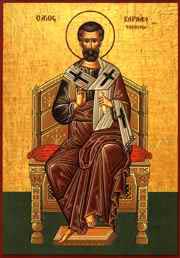
John Dominic Crossan quotes Koester as stating that New Testament writings are used "neither explicitly nor tacitly" in the Epistle of Barnabas and that this "would argue for an early date, perhaps even before the end of I C.E." Crossan continues (The Cross that Spoke, p. 121):
Richardson and Shukster have also argued for a first-century date. Among several arguments they point to the detail of "a little king, who shall subdue three of the kings under one" and "a little crescent horn, and that it subdued under one three of the great horns" in Barnabas 4:4-5. They propose a composition "date during or immediately after the reign of Nerva (96-8 C.E.) . . . viewed as bringing to an end the glorious Flavian dynasty of Vespasian, Titus, and Domitian . . . when a powerful, distinguished, and sucessful dynasty was brought low, humiliated by an assassin's knife" (33, 40).
In 16:3-4, the Epistle of Barnabas says: "Furthermore he says again, 'Lo, they who destroyed this temple shall themselves build it.' That is happening now. For owing to the war it was destroyed by the enemy; at present even the servants of the enemy will build it up again." This clearly places Barnabas after the destruction of the temple in 70 CE. But it also places Barnabas before the Bar Kochba revolt in 132 CE, after which there could have been no hope that the Romans would help to rebuild the temple. This shows that the document comes from the period between these two revolts.
Jay Curry Treat states on the dating of Barnabas (The Anchor Bible Dictionary, v. 1, pp. 613-614):
Since Barnabas 16:3 refers to the destruction of the temple, Barnabas must be written after 70 C.E. It must be written before its first undisputable use in Clement of Alexandria, ca. 190. Since 16:4 expects the temple to be rebuilt, it was most likely written before Hadrian built a Roman temple on the site ca. 135. Attempts to use 4:4-5 and 16:1-5 to specify the time of origin more exactly have not won wide agreement. It is important to remember that traditions of varying ages have been incoprorated into this work.
Treat comments on the provenance of the Epistle of Barnabas (op. cit., p. 613):
Barnabas does not give enough indications to permit confident identification of either the teacher's location or the location to which he writes. His thought, hermeneutical methods, and style have many parallels throughout the known Jewish and Christian worlds. Most scholars have located the work's origin in the area of Alexandria, on the grounds that it has many affinities with Alexandrian Jewish and Christian thought and because its first witnesses are Alexandrian. Recently, Prigent (Prigent and Kraft 1971: 20-24), Wengst (1971: 114-18), and Scorza Barcellona (1975: 62-65) have suggested other origins based on affinities in Palestine, Syria, and Asia Minor. The place of origin must remain an open question, although the Gk-speaking E. Mediterranean appears most probable.
Concerning the relationship between Barnabas and the New Testament, Treat writes (op. cit., p. 614):
Although Barnabas 4:14 appears to quote Matt 22:14, it must remain an open question whether the Barnabas circle knew written gospels. Based on Koester's analysis (1957: 125-27, 157), it appears more likely that Barnabas stood in the living oral tradition used by the written gospels. For example, the reference to gall and vinegar in Barnabas 7:3, 5 seems to preserve an early stage of tradition that influenced the formation of the passion narratives in the Gospel of Peter and the synoptic gospels.
Go to the Chronological List of all Early Christian Writings
Please buy the CD to support the site, view it without ads, and get bonus stuff!
Early Christian Writings is copyright ©
Peter Kirby <E-Mail>.
Kirby, Peter. "Epistle of Barnabas." Early Christian Writings. <http://www.earlychristianwritings.com/barnabas.html>.